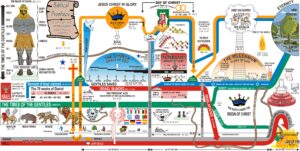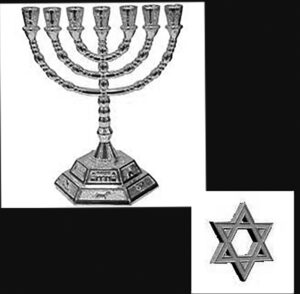 ‘After These Things’ Chapter 4.1 – The Present Hope of the Church
‘After These Things’ Chapter 4.1 – The Present Hope of the Church
From our book ‘After These Things – Summaries of John Nelson Darby’s Papers on Prophecy – and more…’ Compiled by Daniel Roberts. For more about this book click on the picture or CLICK HERE
The Purpose of Prophecy
A summary of the First Lecture by J N Darby on the Present Hope of the Church – Geneva 1840 entitled ‘Introduction.
What is the Purpose of Prophecy?
Communion with God as to Prophecy
The Christian’s Assurance
The study of prophecy is of little point unless we Christians are sure of our eternal salvation in Christ and have experienced its results. Without hope, we are the most miserable of all men (See 1 Corinthians 15:19). We should not only know that the Father’s house with all its privileges is our home, but we are to be happy there too. Our hearts are associated with Christ and realise His love. We are confident too: God treats us as His friends and through prophecy, He reveals the things that occupy Him in heaven. This emphasises to us that we are strangers and pilgrims here. Accordingly, we become free of human objects, cares and distractions and dependent on the One who knows the end from the beginning.
Dispensations
We are currently in the dispensation of grace, which started when the Spirit came at Pentecost (AD29) and will end at the Rapture. After that, it will be too late to be convinced of the truth, or to convict others of the terrible wrath of God at the final judgment.
The Great Tribulation will be followed by the dispensation of the fullness of times – the millennial kingdom when God will gather together all things in Christ who was typified in Abraham’s day as the Royal Priest Melchisedec. God will be known as ‘the Most High God, Possessor of heaven and earth.’ (Gen 14:19).
Note: while Darby, more than most showed how time was divided into dispensations, he did not produce a formal list of dispensations. Based on the works of C I Schofield and others, the following list forms the backdrop of this book. They are described in detail in chapter 2.2 (above) and are listed here:
- Innocence – till the fall of Adam
- Conscience – Adam to Noah
- Human Government – Noah to Abraham
- Promise – Abraham to Moses
- Law – Moses to Christ
- Grace – Christ to the Rapture
- Millennial Kingdom (or Fullness of Times)[1]
The Jews and the Church
We need to distinguish between that which applies to the Jews and to the ‘nations’, before the birth of Christ and after the Rapture, and that which applies to the Church. It is in the way God is known that the differences are most striking.
The Jews/Israel
The prophetic books of the Old Testament, plus Matthew 24 and 25, Mark 13 and Luke 21 centre around Israel. God’s earthly people were warned as to the consequence of disobedience to God and idolatry, which led up to the overthrow of Israel and the captivity of Judah. God made Himself known as ‘Jehovah[2]’ (or more literally ‘Yahweh’) to the Jews, though many Jews consider this name too holy to pronounce. In the Gospels, Jesus is presented as the Messiah, the centre of God’s promises and blessings to the Jewish nation. Prophecy looks forward to a kingdom here enjoyed by the ‘Remnant’.
To the Church
It is often noted that the Church, the Assembly does not form part of Old Testament prophecy in any way. To the Church, God presents Himself as ‘Father’ and Jesus as the ‘Son of God’. We are His brethren – children of God and members of His family. He, the Firstborn, is the expression of all the glory of the Father.
What is the Purpose of Prophecy?
Prophecy and its fulfilment were not written for contemporary Israel. Prophecy belongs to the Church now, and it will belong to the Remnant in a coming day, as a light or torch before things take place. God tells us the truth; Satan does not. Do we doubt God?
Most, if not all, prophecy is to be fulfilled after the end of this dispensation. Then it will be too late to be convinced as to the truth. The day of grace will be over. Those unbelievers left will experience terrible judgment.
Satan has deceived many by introducing the thought that partially fulfilled prophecies, have already been completed.
However, we are to be restful in reading God’s Word. We have been delivered from the coming wrath. We are to cleave to Jesus, rather than our own understanding for enlightenment. As things unfold, we see the purposes of the Most High, opening up His character – His faithfulness, justice and long-suffering. He will certainly judge proud iniquity and execute vengeance on these who corrupt the earth, so that His government may be established in peace and blessing.
The judgment of God is to come upon the nations; the church is informed of this; and, thanks to the teaching of the Holy Spirit, understands it, believes it, and escapes the things which are coming.
The Sceptic as to Prophecy
The sceptic views prophecy as merely speculative, vague and uninfluential, the imaginations of proud hearts. The future is conjured up and imagined: how Satan deceives! But prophecy reveals God’s thoughts as to things to come. And the Christian rejoices that ’the earth shall be filled with the knowledge of the glory of the Lord, as the waters cover the sea’ (Habakkuk 2:14). God will show how.
Communion with God as to Prophecy
Through communion, which is eternal, God comforts and sanctifies us to prevent our hopes being vague. Thank God ‘we have not followed cunningly devised fables, when we made known unto you the power and coming of our Lord Jesus Christ, but were eyewitnesses of his majesty. For he received from God the Father honour and glory, when there came such a voice to him from the excellent glory, This is my beloved Son, in whom I am well pleased. And this voice which came from heaven we heard, when we were with him in the holy mount.
We have also a more sure word of prophecy; whereunto ye do well that ye take heed, as unto a light that shineth in a dark place, until the day dawn, and the day star arise in your hearts: Knowing this first, that no prophecy of the scripture is of any private interpretation. For the prophecy came not in old time by the will of man: but holy men of God spake as they were moved by the Holy Ghost.’ (2 Peter 1:16-21)
[1] See Schofield Reference Bible – note to Gen 1:28, and Chapter 2.2 above.
[2] J N Darby writes as to the Name of Jehovah: ‘Jehovah was a proper name of God to Israel, and declared positively to be such, though the name of the one true supreme God. Now for the believer the use of the names of God carries blessed divine instruction with it, for all His names have a meaning: Almighty, Jehovah, Father, all have a sense to his soul… The proper place of Nothing can be more important as a key to the whole question of God being Jehovah, and the peculiar God of Israel, and yet the one supreme and universal God (a thought so easily lost, at any rate as to goodness, if not as to power, by Jewish pride). It corrects all that a Jew could draw falsely from his peculiar position. (JND Collected Writings Vol 8 Prophetic 3 page 182)
Note that in his English translation Darby uses the name Jehovah for יְהוָה֙/YHVH/Strong H3068. KJV and most modern translations use LORD in capitals. JND’s French translation used l’Éternal. I know no Hebrew, but the Jews replace that name when speaking of the normal word for Lord, אָדוֹן/Adonai/Strong H113.



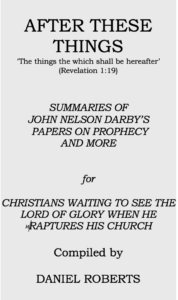
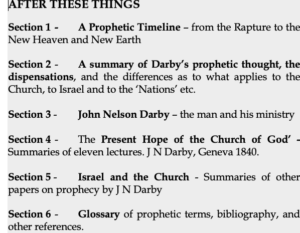
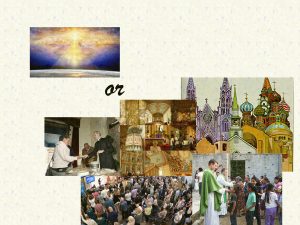 Recently a brother wrote to me needing to answer the following question:
Recently a brother wrote to me needing to answer the following question:


